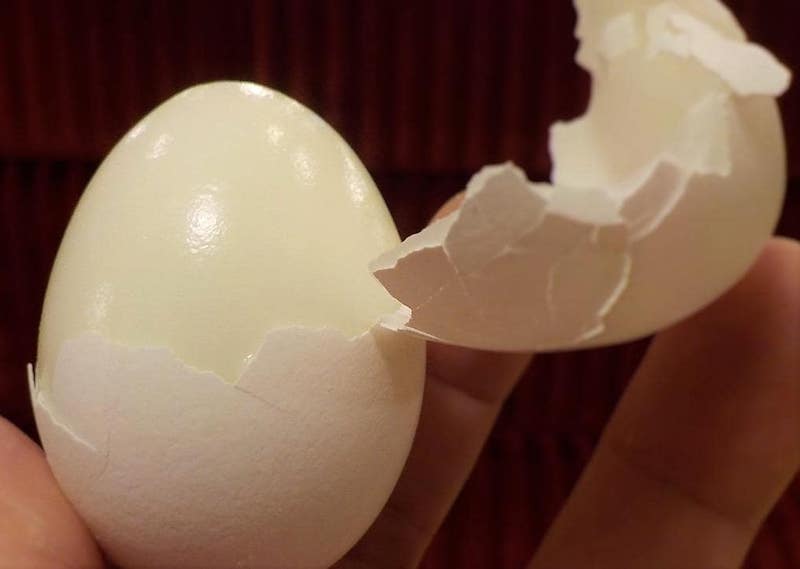Boiled eggs are a delicious, nutritious snack that can be eaten alone or added to various foods.
However, nothing ruins a boiled egg like a shell that’s hard to peel, taking extra time and effort and wasting a lot of protein-rich egg white in the process.
Over the years, many tips and hacks have come about to help make boiled eggs easier to peel, and boiling eggs with vinegar is one of the most famous.
So does adding vinegar make boiled eggs easier to peel? And how do you work with vinegar and boiled eggs? Here’s everything you need to know.

What Does Vinegar Do to Boiled Eggs?
Eggshells are primarily made of calcium carbonite. The acetic acid in vinegar attacks the calcium in the eggshells, breaking them down as they boil.
As a result, eggs boiled in vinegar have thinner and more brittle shells, making the eggs easier to peel.
How Much Vinegar Do You Put in Boiled Eggs?
When you read recipes online, there are tremendous differences in the amount of vinegar you should add to the water when you boil eggs.
Too much vinegar affects the flavor of the eggs because the eggshell is porous and will absorb the flavor of vinegar in the water.
The amount of vinegar depends on the amount of water you are using.
Most boiled egg recipes simply instruct you to add “enough water to cover” the eggs by 1 inch, making it difficult to estimate the correct amount of vinegar.
The right amount of vinegar to add to make easy-to-peel boiled eggs is 1 tablespoon or 15 ml of vinegar for every quart of water in the pot.
How to Make Hard-Boiled Eggs Easy to Peel with Vinegar
Follow these steps to boil eggs with vinegar and make them easy to peel.
- Measure as many quarts of water as you need to fill a pot or saucepan.
- Fill your pot or saucepan with water.
- Add 1 tablespoon or 15 ml of vinegar for every quart or liter of water in your pan.
- Bring the water + vinegar to a rapid boil over high heat.
- Gently add room-temperature eggs to the boiling water.
- Boil for as long as necessary to reach your desired level of doneness.
- Remove eggs from the boiling water and immerse them in ice water.
- Keep eggs in cold water until they are cool enough to handle.
- Peel cooled eggs right away.
- Store boiled eggs in an airtight container in the refrigerator.
Tips for Boiling Eggs with Vinegar
These are our favorite tips for boiling easy-to-peel eggs with vinegar.
Vinegar Breaks Down the Eggshell
This thinning and degradation of the shell is what you want to make easy-peel eggs by adding vinegar.
However, if you want boiled eggs with a smooth, beautiful shell, for example decorating Easter eggs, do not add vinegar to the water.
Avoid Adding Too Much Vinegar
The acetic acid in vinegar becomes more powerful when heated, so adding much vinegar to your eggs is unnecessary.
Chefs and experts who advise people to not use vinegar claim it affects the taste of the eggs.
This is important if you are boiling eggs for a simple, delicate preparation, like soft-boiled eggs eaten alone.
It’s less critical for more complex recipes where other flavors will be incorporated, like egg salad. In any case, take care to not add too much vinegar.
Use Older Eggs
Eggs 7-10 days old are easier to peel after boiling than fresh eggs.
Older eggs have become less acidic, and their internal membrane has dried and contracted, making them easier to peel after boiling.
Start with boiling water. While there is debate about starting boiled eggs from cold water or hot, the best way to boil eggs is to add them to already-boiling water.
You can time their cooking more accurately, and the hot water shock contracts the inner membrane, making the eggs easier to peel.
Finish Boiled Eggs in an Ice Water Bath
The ice water bath stops the cooking process, preventing eggs from overcooking.
Overcooked hard-boiled eggs have a green or grey layer around the yolk, and the egg white can get stiff and rubbery.
Ice water keeps your eggs at the precise amount of cooking you want. Once again, ice water shocks the eggs, making them easier to peel.
Peel Boiled Eggs Right Away
Most people find that even when using vinegar in their boiled eggs, they are easier to peel just after cooking than if they have been refrigerated for a day or two.
Allow the eggs to cool until they are easy to handle, then remove the shells and store them un-shelled in the refrigerator.
Always refrigerate boiled eggs, and place them in an airtight container to prevent the eggs from absorbing refrigerator flavors or odors.
In Summary
Among all the tips, tricks, and myths to make perfect, easy-peel boiled eggs, vinegar is one of the best.
Vinegar breaks down eggshells during the boiling process, making the finished eggs easier to peel.
However, vinegar alone is not a magic solution; it’s best to use vinegar while following the other tips that make it easier to cook and peel boiled eggs. Baking soda also helps with making boiled eggs easier to peel.
Unless you’re making Easter eggs or decorating the shells, adding vinegar when you cook hard-boiled eggs results in slippery shells that slide away in sheets, leaving your boiled eggs smooth, even, and beautiful.












